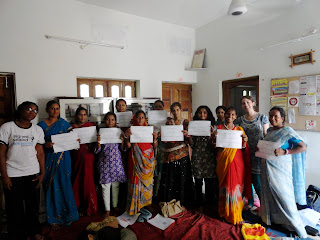 |
Wednesday, July 20, 2011
Girls Education Camp
Vikalp’ s Roshani Resource Centers
 Part of the mission of the RRC is to discuss the importance of education, promote healthy gender roles, and mitigate violence against girls and women. When one walks into any RRC center, they will see the walls covered in posters such as the Hindi and English alphabet, healthy hygiene practices, and Vikalp gender violence and girl’s education posters. Shelves in these centers hold a small collection of books and art materials for the children’s enjoyment.
Part of the mission of the RRC is to discuss the importance of education, promote healthy gender roles, and mitigate violence against girls and women. When one walks into any RRC center, they will see the walls covered in posters such as the Hindi and English alphabet, healthy hygiene practices, and Vikalp gender violence and girl’s education posters. Shelves in these centers hold a small collection of books and art materials for the children’s enjoyment.  However, these rooms are often cramped, lack electricity, and have no fans—making the facilities almost unbearable in Jodhpur’s heat. Due to these issues, Vikalp is now looking to rent slightly larger rooms for these resource centers. Furthermore, interns Shamyra and Tess have decided to use their grant to purchase and have installed ceiling fans for the 10 RRC centers. This grant is allotted to them through the Foundation for Sustainable Development with whom they are also working.
However, these rooms are often cramped, lack electricity, and have no fans—making the facilities almost unbearable in Jodhpur’s heat. Due to these issues, Vikalp is now looking to rent slightly larger rooms for these resource centers. Furthermore, interns Shamyra and Tess have decided to use their grant to purchase and have installed ceiling fans for the 10 RRC centers. This grant is allotted to them through the Foundation for Sustainable Development with whom they are also working.  |
| Young boy reading in Sargara Basti RRC |
 |
| Meeting at a RRC |
Tuesday, July 19, 2011
Women's Health Training
On Thursday and Friday July 14th and 15th, Vikalp led a two day health training in Jodhpur for community women. The women selected for the training were the Roshani Resource Center (located in ten bastis) facilitators. Facilitators each brought along a volunteer from their community so there were a total of 15-20 women at the training. The program covered the subjects of nutrition, sanitation/hygiene, skincare, and female sexual health.
Vikalp interns Shamyra Henderson and Tess Shiras, who are working with the organization for two months this summer, organized the training. Staff members Yaseen and Madhu helped facilitate the training, and two doctors attended the training from Vasundhara Hospital and Women’s Fertility Research Center. On day one, Doctor Priscilla, a dietician at Vasundhara hospital, spoke
on nutrition. The women were very engaged during the discussion, and asked many questions following Dr. Priscilla’s discussion. Dr. Priscilla spoke about the importance of maintaining a balanced diet and exercising, among other topics. On day two, Dr. Renu, a gynecologist at Vasundhara, spoke about proper hygiene and sexual health for women. During her discussion, Dr. Renu not only discussed the topics of female health with the women, but she also reminded the women about the importance of educating young girls and other women in their communities.
During the training, the women also participated in several
activities concerning proper sanitation and hygiene. These activities and games were designed to help them better understand the concepts and ideas that they had learned from the discussions on sanitation, hygiene, and nutrition. At the conclusion of the training, all of the participants received certificates congratulating them on the completion of the two-day training. All of the participants expressed that the training would not only be useful for them, but also to the members of their communities.











